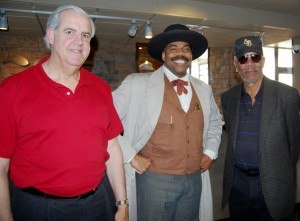Fort Smith’s sanitation boss fired, lawsuit and discrimination complaint likely to follow
by December 7, 2015 6:23 pm 1,425 views

Baridi Nkokheli, the head of Fort Smith’s Department of Sanitation for more than 10 years
Baridi Nkokheli, the head of Fort Smith’s Department of Sanitation for more than 10 years and popular re-enactor of legendary U.S. Marshal Bass Reeves, was fired Monday (Dec. 7) by acting City Administrator Jeff Dingman. Nkokheli said the reasons for his termination are unfounded and he plans legal action against the city.
Dingman told Talk Business & Politics that Nkokheli (pronounced NO-KO-KAYLEE) was dismissed “for violation of personnel policies and the code of business conduct.” Dingman said the violations were serious enough to warrant sudden dismissal and would stand up under scrutiny.
“I wouldn’t have taken such an action if I didn’t think so,” Dingman said.
He has not yet named an acting director of the department, but plans to meet with top managers Tuesday to begin that process.
INSUBORDINATION OVER DEMOTION
Nkokheli said he was terminated for insubordination related to the demotion of Dustin Bradshaw, and for alleged personal use of city equipment, seeking a personal loan from a vendor, and other complaints which he said “are completely unfounded” or do not meet the level of being fired.

Most of the support for his firing comes from the testimony of five former or current Department of Sanitation (DOS) employees, Nkokheli said. One of those testifying against Nkokheli was Dustin Bradshaw, who was recently demoted as the DOS commercial/industrial division manager. Nkokheli said and Dingman disagreed over the demotion, with Nkokheli saying Dingman, who is also the city’s interim human resources director following the recent resignation of Richard Jones, made his objection with his “HR director hat on.” Nkokheli said an HR director can’t override a department head’s decision to promote or demote an employee.
“Jeff Dingman told me my justification for that (demoting Bradshaw) was valid … but then he wanted me to postpone that action, but I didn’t … because he identified himself as calling as the HR director,” Nkokheli said.
Nkokheli also said the five who testified against him are good friends. He noted that Bradshaw is the Ozark police officer forced to resign in 2009 after he tasered a 10-year old girl. Bradshaw was then hired by Joseph Hopper, the former No. 2 person at the DOS who recently was hired to run sanitation services in Conway. According to Nkokheli, Hopper served with Bradshaw on the Ozark police force.
“He (Bradshaw) came here and he was totally unqualified for the job,” Nkokheli said.
Continuing, he noted: “So I’ve been terminated because of the testimony of these five guys, and everything brought up against me is false. These guys are all good friends, you know, some are hunting buddies … and so when I made the move to demote Bradshaw, they all circled the wagons.”
TOP JOB ‘THREAT’
Nkokheli also said he was initially encouraged “by several on the board and some former board members” to seek the city administrator’s post following the sudden resignation of Ray Gosack in early July. Nkokheli said he did not want the job and even told Dingman – who has applied for the city’s top job – that he would not apply and would not be a threat.
However, Nkokheli said soon after he told Dingman about not seeking the top job that he began to be “harassed” by Dingman and city auditor Tracey Shockley.
“I feel that part of the reason for being terminated is because Jeff Dingman is retaliating against me, because I was recommended by so many people to do that (apply for city administrator). … He sees me as a threat. He needed a pretext to fire me, so that’s what we got, and that’s why at 2 p.m. today I was fired,” Nkokheli said.
Nkokheli said he plans to sue the city for wrongful termination and possibly other issues, but does not want his job back. He also is pursuing a discrimination complaint with the federal Equal Employment Opportunity Commission. Nkokheli was the only African American serving as a city department head. Coincidentally, Fort Smith Police Officer Wendall Sampson filed on Nov. 30 a discrimination/retaliation lawsuit against the Fort Smith Police Department (FSPD). In the lawsuit, Sampson’s attorney noted that the FSPD has not promoted a black officer since 1988 and has not hired a black officer since 1995.
NKOKHELI HISTORY, BASS REEVES WORK
Prior to arriving in Fort Smith in 2005, Nkoheli was with the Durham, N.C., sanitation department for 10 years, where he left as a top assistant. He began his more than 37-year career in the sanitation field working as a laborer in the Houston sanitation department to pay for college.
Nkokheli has for many years portrayed Bass Reeves, a legendary African American U.S. Marshal. Reeves was the most feared marshal of his time under U.S. Federal Judge Isaac C. Parker. Reeves was born a slave in Texas in 1838 and died in Muskogee, Okla., on Jan. 12, 1910. Nkokheli was instrumental in helping to raise more than $300,000 to place a statue of Reeves in downtown Fort Smith. Popular western artist Harold Holden designed and built the statue, which was placed in the city in May 2012.
Nkokheli, through his portrayal of Bass Reeves, has also supported fundraising efforts to build the U.S. Marshals Museum in downtown Fort Smith.
